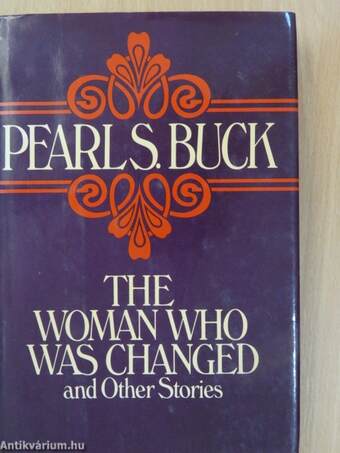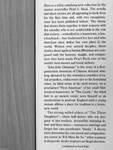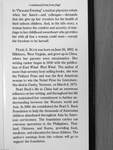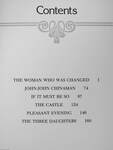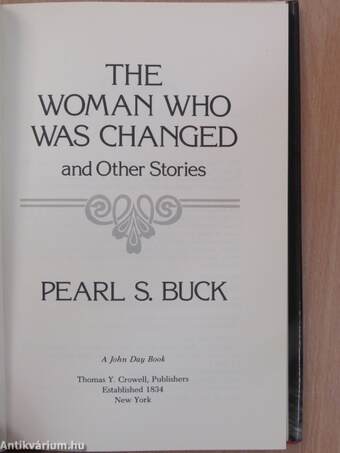1.118.012
kiadvánnyal nyújtjuk Magyarország legnagyobb antikvár könyv-kínálatát
The Woman Who Was Changed and Other Stories
| Kiadó: | Thomas Y. Crowell Publishers |
|---|---|
| Kiadás helye: | New York |
| Kiadás éve: | |
| Kötés típusa: | Félvászon |
| Oldalszám: | 178 oldal |
| Sorozatcím: | John Day Book |
| Kötetszám: | |
| Nyelv: | Angol |
| Méret: | 21 cm x 14 cm |
| ISBN: | 0-690-01789-8 |
naponta értesítjük a beérkező friss
kiadványokról
naponta értesítjük a beérkező friss
kiadványokról
Fülszöveg
Here is a richly satisfying new collection by the
master storyteller Pearl S. Buck. The novella
and short stories are all appearing in book form
for the first time and, with two exceptions,
none has been published before. The theme
that draws them together is their concern with
the outsider who is not comfortable in the role
that society—embodied by a hometown, a law,
a husband—has fashioned for her and who
therefore must define her own place in the
world. Written over several decades, these
stories about ageless human dilemmas are com-
posed with the honesty, insight, and compas-
sion that have made Pearl Buck one of the
world's best-known and loved authors.
"John-John Chinaman" is the story of a first-
generation American of Chinese descent who,
long alienated by the relentless cruelties of ra-
cial prejudice, rediscovers ties to his homeland
when, by blind virtue of the draft lottery, he is
proclaimed "First American" of his small Mid-
western hometown. In... Tovább
Fülszöveg
Here is a richly satisfying new collection by the
master storyteller Pearl S. Buck. The novella
and short stories are all appearing in book form
for the first time and, with two exceptions,
none has been published before. The theme
that draws them together is their concern with
the outsider who is not comfortable in the role
that society—embodied by a hometown, a law,
a husband—has fashioned for her and who
therefore must define her own place in the
world. Written over several decades, these
stories about ageless human dilemmas are com-
posed with the honesty, insight, and compas-
sion that have made Pearl Buck one of the
world's best-known and loved authors.
"John-John Chinaman" is the story of a first-
generation American of Chinese descent who,
long alienated by the relentless cruelties of ra-
cial prejudice, rediscovers ties to his homeland
when, by blind virtue of the draft lottery, he is
proclaimed "First American" of his small Mid-
western hometown. In "The Castle," the titled
heir to an ancient estate sees himself as an
anachronism in postwar England until a young
woman affirms a place for tradition in a brave,
new world.
The strong-willed eldest of "The Three
Daughters"—three half-sisters who are pro-
geny of one restless, irresistibly charming fa-
ther and three wives—renounces marriage and
forges her own unorthodox "family." A doctor
must determine his own moral and compassion-
ate course in "If It Must Be So," when a patient
in desperate straits requests an illegal abortion.
(continued on back flap)
( continued from front flap)
In "Pleasant Evening" a nuclear physicist rebels
when her fiancé—and colleague—demands
that she give up her vocation for the health of
their unborn children. And, in the title story, a
woman leaves the comfort and security of mar-
riage to her childhood sweetheart who provides
her with all that a woman could want—except
the freedom to be herself.
Pearls. BuCKwasbornonJune26,1892, in
Hillsboro, West Virginia, and grew up in China,
where her parents were missionaries. Her
writing career began in 1930 with the publica-
tion of East Wind: West Wind. The author of
more than seventy best-selling books, she won
the Pulitzer Prize and was the first American
woman to win the Nobel Prize for Literature.
She died in Danby, Vermont, on March 6, 1973.
Pearl Buck's life in China had an enormous
influence on her writing, and throughout her life
she maintained her commitment to further un-
derstanding between the Western world and
Asia. In 1964 she established the Pearl S. Buck
Foundation to help the thousands of Amerasian
children abandoned throughout Asia by Amer-
ican servicemen. The foundation carries out
overseas operations in the Philippines, Thai-
land, Okinawa, and Korea, providing food,
medicine, and education for these children. The
author's earnings from this volume will go to
support the foundation. Vissza
Témakörök
- Idegennyelv > Idegennyelvű könyvek > Angol > Szépirodalom > Regény, novella, elbeszélés
- Szépirodalom > Regény, novella, elbeszélés > Az író származása szerint > Amerika > Amerikai Egyesült Államok
- Szépirodalom > Regény, novella, elbeszélés > Tartalom szerint > Társadalmi csoportok > Nők
- Szépirodalom > Regény, novella, elbeszélés > Tartalom szerint > Összegyűjtött novellák
- Szépirodalom > Regény, novella, elbeszélés > Irodalmi díjas szerzők > Pulitzer-díjasok
- Szépirodalom > Regény, novella, elbeszélés > Irodalmi díjas szerzők > Nobel-díjasok


